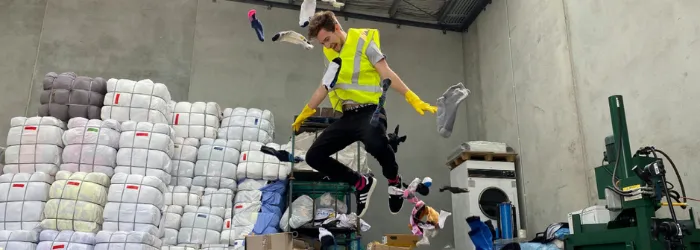Upparel stepped up

Good for the planet = good for business: How Upparel stepped up
In a few short years, a Melbourne company has made the journey from conventional retailer to circular fashion hero, proving along the way that sustainability truly equals success.
It starts with socks
Formerly known as Manrags, the company started in 2016, originally as a subscription service for men’s socks and undies and began its anti-waste program in 2019. “We realised, hang on, how much how much product have we sent out? What effects have we had on landfill? And that’s when we really started to look at how much we’d added to textile landfill,” explained co-founder, Tina Elias. “Socks and underwear can’t be donated to charity. So where are they going? Essentially they going to the tip. We can stop that by accepting old socks from customers and diverting them from landfill.”
In just four months they redirected 15,000 kg of socks from the tip. “There was such a high demand for people to send us their other textiles, and then Covid gave us the opportunity to pivot a little,” says Tina Elias. They began to accept all textiles. “Everyone was home and they were clearing up their cupboards, and charities were closed”, she explains. Manrags began accepting all types of textiles, as well as shoes. Customers pay to have a box of unwanted clothes collected (from anywhere in Australia, use the code CLEANUP to save $5), and receive a $25 store credit, redeemable on orders of stylish socks and underwear. It is then sorted and either repurposed or recycled.
Reuse
Upparel is an example of the circular economy in action. Charity partners such as Sacred Heart Mission and Ready Set distribute clothing to people who need it, accounting for over half of the textiles Upparel receives. “Seventy percent of textiles that come into our warehouse from consumers is fit for wear. A lot of clothes still have the tags on them,” says Tina. “When we say fit for wear, if it’s not good enough for us, it’s not good enough to give to a charity. We’ve teamed up with charity partners all over Australia and we distribute these fit for wear pieces all over the country. We don’t send anything offshore, because sending products offshore only causes problems in third world countries,” she explains.
The clothing has already been sorted and selected for wearability, unlike many direct clothing donations. Charities in Australia last year spent $13 million disposing of unsaleable textiles to landfill. “So we are coming forward and saying hey don’t – this is from people who are truly dumping their rubbish out in front of charity shops. They’ve created this burden for charities – horrible because charities are not-for-profit,” says Tina. It’s also more cost-effective, as recycling is cheaper than sending items to landfill.
Repurpose
Then 20% of textiles are repurposed, such by making old jeans into new denim products with partner store Homie. “The repurposing part is in its infancy, but more and more brands are coming on board and taking advantage of these textiles that we have which are fit for repurposing,” says Tina.
Recycle
The rest of the textiles are recycled. Cotton and similar fabrics are shredded, some to be used to fill mattresses, pet beds and home insulation. Polyester-based textiles are shredded and processed into chips which are reused to make more polyester.
Recycling is done by partner companies. “We just don’t have the infrastructure setup as of yet, but we’re definitely working on that,” says Tina. “The company still in its infancy. Definitely within the next five years, we’d love to have machinery in order to be recycling our own products in Australia That would be really incredible.”
How do you Step Up and get involved?
Simply package up your textiles into any type of box (no larger than check-in luggage) — a food delivery box, grocery box or moving box would work. You can also pack your items into a durable bag or satchel.
Then on the Upparel website, use code CLEANUP to save $5 on your collection (from anywhere in Australia), and receive a $25 credit to spend in-store for your first collection.
What can be recycled:
- Clothing items (jeans, shirts, coats, etc)=
- Hats
- Bags (handbags, duffel bags, etc)
- Wireless Bras
- Swimwear
- Socks and stockings
- Shoes
- Linen (bedding, towels, tea towels, etc)
- Fabric mattress protectors (not waterproof/plastic)
- Fabric off-cuts and sewing scraps
- Fabric couch covers and curtains
- Bathers & Swimwear
- Wetsuits
What happens to your textiles:
Currently 65% of items Upparel are receiving are in new or fit-for-wear condition and are prepared to be passed onto Australian partners; Save The Children, Sacred Heart Mission, Ready Set Australia, St Kilda Mums and Good360 Australia. The remaining 35% are assessed for their suitability to be up-cycled into new items or recycled into new materials.
